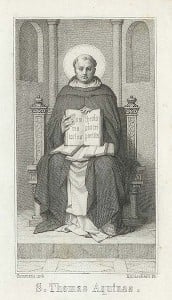 We’re blogging through St. Thomas Aquinas’ Compendium Theologiae, sometimes called his Shorter Summa. Find the previous posts here.
We’re blogging through St. Thomas Aquinas’ Compendium Theologiae, sometimes called his Shorter Summa. Find the previous posts here.
In chapter 21, Thomas showed that all perfections—good qualities—in created things reflect some perfection in God. But the perfections in created things are many; how can one metaphysically simple God contain multitudes? Thomas addresses this in Chapter 22.
God is one, simple, having no parts (Thomas hasn’t forgotten the Trinity, here; but it will be some chapters before we get there). And therefore,
If we gather together the various points established thus far, we perceive that all perfections in God are in reality one. We have shown above that God is simple. But where there is simplicity, there can be no distinction among the perfections that are present. Hence, if the perfections of all things are in God, they cannot be distinct in Him. Accordingly they are all one in Him.
We say that God is almighty, omnipotent; we say that God is Truth itself, Goodness itself, Beauty itself; we attribute various things to God. That’s because our intellects are too weak to understand Him as He understands Himself. We have to approach God through our understanding of His creation.
Through pondering creation we come to have a notion of Truth, of Goodness, and of Beauty; and we attribute these to God, and rightly so. But Truth is not the whole story; Goodness is not the whole story; Beauty is not the whole story; rather, God is the whole story, and when you say “God” you have said all of the rest.
There’s no other possibility, given what Thomas has already shown; so rather than giving a second argument, Thomas goes on to show how higher things are often simpler than lower things.
This will become evident to anyone who reflects on our cognitive powers. A higher faculty has a unified knowledge of all that is known through the lower faculties according to diverse aspects. All that the sight, the hearing, and the other senses perceive, the intellect judges with the one, simple power that belongs to it.
According to Thomas, and Aristotle before him, our faculties come in three sets. Like plants, we take in nourishment and we grow. Animals do the same, but they can also sense the world around them and move about to procure their needs. Like animals, we can sense the world through sight, sound, smell, taste, and touch; but we can reflect upon what we perceive, and abstract from it. This faculty is called the intellect. We use the intellect to reason about the world around us, and to make judgements. Intellect is a higher faculty than the senses, and in a way it unites all of them, as Thomas says.
Something similar appears in the sciences. The lower sciences are multiplied in accord with the various classes of beings that constitute their objects. Yet one science which holds the primacy among them is interested in all classes of beings. This is known as first philosophy.
By “science”, Thomas means a body of knowledge about a particular subject, along with the methods used to explore that subject. Physics is the science of the physical world, politics is the science of how people can live together in community, medicine is the science of good health, and so on. And top of all of the other sciences is metaphysics, the study of being in general rather than this kind of being or that kind of being. “First philosophy” is another name for metaphysics; it means “philosophy in the primary sense”.
The same situation is observed in civil power; in the royal power, which is but one, are included all the powers that are distributed through various offices within the jurisdiction of the kingdom. In the same way perfections, which in lower things are multiplied according to the diversity of these things, must be united in the pinnacle of being, that is, in God.
This doesn’t quite describe modern society, alas, but fortunately it’s only an illustration.












